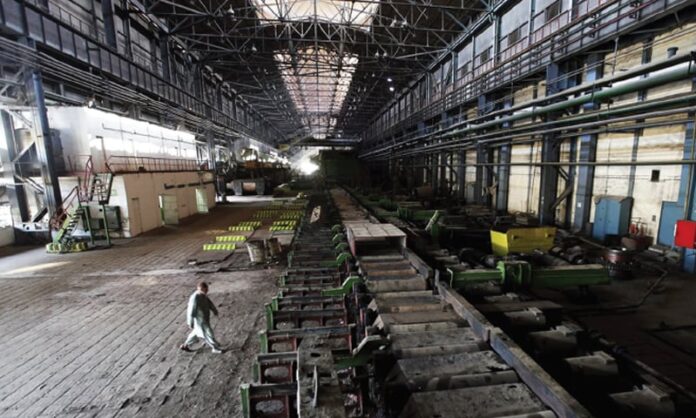ISLAMABAD: Although the Pakistan Tehreek-e-Insaf (PTI) leaders have been criticising the previous governments for “failing to devise a strategy to revive the loss-making entities”, the incumbent government has also failed to give any plan for the revival of state-owned organisations, especially the Pakistan Steel Mills (PSM) and Utility Stores Corporation (USC).
Members of the Senate’s Standing Committee on Industries and Production on Monday expressed serious concerns over the government’s failure in formulating the revival plans for PSM and USC even after the passage of one year.
The committee also noted that one cabinet member was even “facilitating the smuggling of steel scrap from Iran” (to be used by re-rolling mills).
“Although the incumbent government has been discussing serious issues at every available forum, including the standing committees, there is no futuristic approach,” Committee Chairman Senator Ahmed Khan lamented. “It is unfortunate that the lethargic approach is not only benefiting the steel mafias in the country but the delays in the revival plan are also increasing the liabilities of PSM, making it further less attractive for the investors.”
A group of PSM stakeholders informed the committee that the Ministry of Industries & Production and the Federal Board of Revenue were not interested in resolving the matter.
Advisor to PM on Commerce, Industries & Production Abdul Razzak Dawood and Advisor on Poverty Alleviation Dr Sania Nishtar on the occasion seemed complacent as they faced a barrage of queries over ways to improve the performance of respective government entities.
The committee chairman stated that the issue should be highlighted whenever future policy was discussed at the Economic Coordination Committee (ECC).
“We know mafia-like groups are importing steel scrap through under-invoicing; one solution is to take a policy decision and allow all imports through PSM only. This will regulate import figures and even the business of re-rolling mills will become documented,” the committee chairman stated. “The PSM will at least earn something.”
However, there was no reply from the government side over the suggestion and the committee was instead informed that a PSM financial advisor would be appointed soon to suggest modes to invite strategic investors.
Currently, PSM’s deficit stood at Rs510 billion with Rs40 billion accumulated in the last 14 months, the PSM officials informed, adding that the total liabilities in terms of pension and gratuity of retired employees were around Rs15.8 billion.
The committee members criticised the financial management of the Ministry of Industries and Production as well as the Ministry of Finance.
“You can raise Rs5 billion through banking sector or by pledging the steel products and scrap already present in PSM,” the committee chairman suggested. “This way, the government can at least resolve the pension-related issues. The plan of the finance ministry to clear the pensioners’ dues in 3-5 years is like waiting to see them leave this world.”
Committee member Senator Kalsoom Parveen stated that things were revolving in circles ever since the privatisation of PSM in 2005. “Now in 2019, we are still discussing the uncertain future of PSM; at least this government should come up with any idea.”
The committee also discussed the proposal of developing coordination between the Benazir Income Support Fund (BISP) interventions and the utility stores.
Dr Sania Nishtar told the committee that BISP’s had 5.2 million registered women, who were paid Rs5,000 per quarter. The committee had suggested that out of Rs5,000, Rs2,000 worth of vouchers may be distributed to the registered persons, which could be used to purchase items from the utility stores only.
“This will prevent any misuse of cash (smoking etc.) and will also help another state-owned venture with higher sales,” the committee chairman said.
However, Dr Nishtar said that different households have different expenditure requirements and fixing grocery purchases through USC was not viable.
“After working of around 10 months, BISP has adopted a work plan that involves payments through banks and now after adopting this framework, it is difficult to backtrack and do it with the utility stores,” she added.
However, the committee members stressed that the mechanisms could be revised for the good.
The meeting was attended by Senators Aurangzeb Khan, Muhammad Ali Khan Saif, Hafiz Abdul Karim, Asif Kirmani, Pakistan Steel Mills (PSM) Chairman Aamir Mumtaz, Industries Secretary Aamir Khwaja, Finance Special Secretary Qamar Hamid Khan and Poverty Alleviation Secretary Shaista Sohail.




